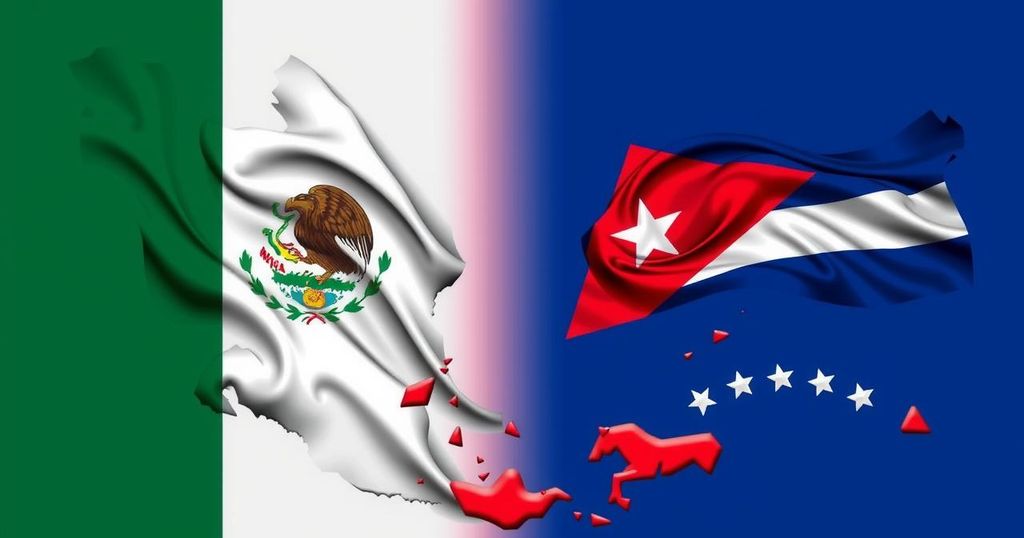Mexico has become a key supporter of Cuba’s dictatorship, providing substantial aid reminiscent of Soviet and Venezuelan support in the past. Under President Claudia Sheinbaum, Mexico has pledged significant oil shipments to Cuba while facing its own domestic crises. This alignment raises concerns about Mexico’s commitment to democratic values and the welfare of its citizens, as it engages in solidarity with one of the Americas’ most repressive regimes.
Mexico has recently positioned itself in a controversial alliance with nations like Russia and Venezuela by providing substantial support to the Cuban government, which has maintained a dictatorship for over six decades. Historically, Cuba has received extensive aid from international partners, first from the Soviet Union, which contributed over $29 billion, followed by Venezuela, which offered $35 billion primarily in oil. As Venezuela struggles economically, Mexico has become Cuba’s primary benefactor, offering food, oil, and resources in an attempt to stabilize the island nation’s failing economy. In a striking political maneuver, the Mexican administration, led by President Claudia Sheinbaum, has implied that cooperation with the United States regarding migration issues would hinge on renewed dialogue with Cuba. This comes after Sheinbaum’s predecessor, Andrés Manuel López Obrador, pledged significant oil shipments to Cuba, highlighting Mexico’s commitment to a regime characterized by human rights violations and political repression. Despite facing a surge in violent crime domestically, including bombings and murders in Mexico, Sheinbaum’s administration has prioritized assistance to the Cuban regime over addressing pressing national issues. This decision reflects a disturbing trend of foreign policy that appears to prioritize ideological solidarity with Cuba over the welfare of Mexican citizens. Moreover, the Mexican government has provided unprecedented oil supplies, positioning itself as Cuba’s second largest oil supplier and surpassing Russian contributions. However, this support has not alleviated Cuba’s internal crises, which include severe mismanagement, corruption, and economic hardship, leaving the Cuban populace to suffer. In conclusion, Mexico’s support for Cuba, marked by Bolivarian solidarity and diplomatic gestures, raises serious concerns about the implications for democratic values within Mexico itself. Any genuine support for the Cuban people would necessitate conditionality linked to human rights improvements and democratic reforms within the island. Instead, Mexico’s current trajectory shows a troubling disregard for these principles in favor of sustaining authoritarian regimes.
The topic revolves around Mexico’s recent political actions concerning Cuba, a nation with a longstanding communist dictatorship. Historically, Cuba has depended on various foreign nations for economic support, initially from the Soviet Union and later from Venezuela. With Venezuela in economic turmoil, Mexico has stepped in as Cuba’s primary ally, offering crucial supplies and support. This new alignment has sparked significant debate about the implications for Mexico’s own domestic issues and its commitment to democratic values.
In summary, Mexico’s increasing support for Cuba, manifested through significant oil shipments and diplomatic efforts, signals a troubling alignment with authoritarian regimes at the expense of its own citizens and the Cuban people’s struggle for freedom. Mexico’s government must critically assess its foreign policy approach to foster genuine support that honors human rights and democratic principles rather than reinforce oppressive governance.
Original Source: thehill.com






